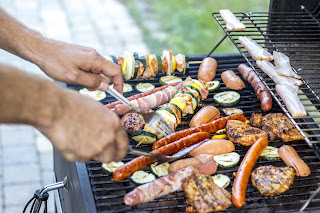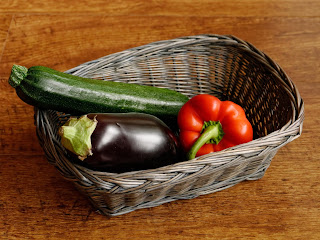Barbecue Meat - Is it healthy or not ?
 We are in the summer time and of course, it's the best season for barbecues! Everybody loves a barbecue I think, don't they? In the end of the spring and during the summer time, It's impossible to see somebody who's not doing a barbecue in my country (Turkey).
We are in the summer time and of course, it's the best season for barbecues! Everybody loves a barbecue I think, don't they? In the end of the spring and during the summer time, It's impossible to see somebody who's not doing a barbecue in my country (Turkey).But I have bad news for you. I'm sorry to say that barbecuing is not a healthy cooking method. When we cook meat at a high temperature, it can produce carcinogenic chemicals which are called PAHs (polycyclic aromatic hydrocarbons) and HCAs(heterocyclic amines). We don't know the mechanism completely for how this happens, but we know what these chemicals consist of and they are not good for your health.
HCAs and PAHs are cancerogenic chemical products of all kinds of muscle meat e.g beef, pork, fish, poultry... when we cook it at high temperature. These mutagenic chemicals can affect DNA and change its construction. (That's why we called them "cancerogenic").
HCAs are formed as a result of the reaction between amino acids, sugars, and creatine with high temperatures (AA + sugar + creatine heat HCA's ). PAHs are formed when meat is cooked directly over the flame or when the fat and juice of the meat drip onto the fire.
It's not important what type of meat you choose to cook. The main point is the temperature of cooking and how long the meat is exposed to heat. If the cooking temperature is high (especially 150°C or higher) and the cooking period is getting longer, it's a more suitable environment to produce HCAs. In other words, if you grill /barbecue a steak or chicken well- done, both of them will contain a high amount of HCAs.
So many studies have shown that HCAs can cause tumor growth (breast, colon, liver, skin, lung, prostate and other organs tumors). In these studies, they found high levels of PAHs can cause cancers too (including leukemia, tumors of the gastrointestinal tract and lungs)
In a recent study with 1508 women diagnosed with breast cancer, high annual consumption of grilled and smoked meat during the pre-diagnosis period was linked with considerable risk of all-cause of mortality by about 23%.
On the other hand, consumption of smoked poultry and fish during pre- and post-diagnosis period was not related to an increased risk of breast cancer specific mortality.
 Another important thing which increases PAH is the fat content of meat. If the meat's fat content is high, it can cause PAH levels to rise. The cause is dripping of the meat fat onto the flame because the smoke coming from this dripping triggers the PAH production.
Another important thing which increases PAH is the fat content of meat. If the meat's fat content is high, it can cause PAH levels to rise. The cause is dripping of the meat fat onto the flame because the smoke coming from this dripping triggers the PAH production. You can prevent producing high levels of PAH by wrapping the meat. Also, in one study, they found a method which is called " safe grill" to prevent these carcinogenic products. It's a filter which you can place between meat and the heat source. You prevent the contact of the meat directly to heat source and fat dripping onto flame with this filter.
But at the end of the day, the average home cook wants to have a delicious and safe BBQ. Here are some tips for reducing HCAs and PAHs when cooking meats:
- Do not cook directly on hot surface or an open flame
- Do not cook for a long time
- Do not use high temperature
- Turn meat often, do not leave one side for a long time
- Avoid fat dripping by trimming the fat before cooking
- Use meat which contains less fat
- Make sure the fire is not smoking too much (in other words wait until the fire is well-lit) before adding the meat.
- Wrapping meat in foil is not healthy
- Cut away any burnt parts before serving or eating
In the end, scientists are fairly sure that eating too much this kind of meat is linked with high risk of colorectal, pancreatic and prostate cancer so if you lıke to barbecue your meat, be aware of the potential risks.
Bibliography
1.Lee, J., Kim, S., Moon, J., Kim, S., Kang, D., & Yoon, H. (2016). Effects of grilling procedures on levels of polycyclic aromatic hydrocarbons in grilled meats. Food Chemistry, 199, 632-638. doi:10.1016/j.foodchem.2015.12.017
2.Parada, H., Steck, S. E., Bradshaw, P. T., Engel, L. S., Conway, K., Teitelbaum, S. L., . . . Gammon, M. D. (2017). Grilled, Barbecued, and Smoked Meat Intake and Survival Following Breast Cancer. Journal of the National Cancer Institute, 109(6). doi:10.1093/jnci/djw299
3.Chemicals in Meat Cooked at High Temperatures and Cancer Risk. (n.d.). Retrieved August 28, 2017, from https://www.cancer.gov/about-cancer/causes-prevention/risk/diet/cooked-meats-fact-sheet


Comments
Post a Comment